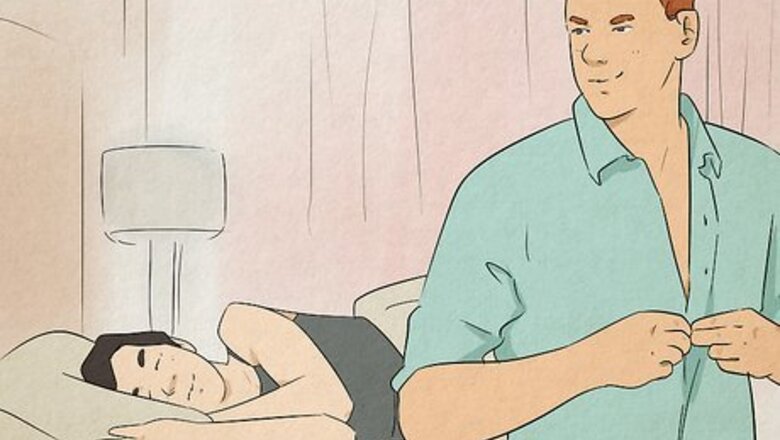
views
They might not realize the relationship is toxic.
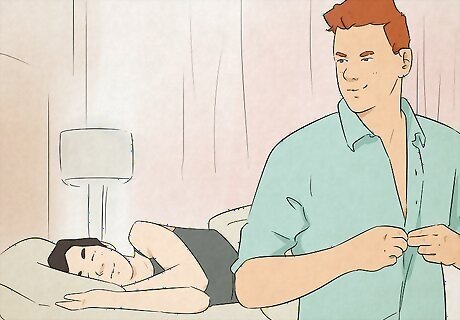
They may minimize toxic behaviors or think they're normal. When a person is trying to make a toxic relationship work, they'll often try to focus on the good things about their partner. They'll sometimes tell themselves things like, "At least he doesn't hit me," or "When things are good, they're really great." Over time, that can lead to a skewed vision of their relationship, where they're not able to recognize how unhealthy it really is. The toxic partner might regularly blame the abuse on the victim—known as gaslighting—so they may blame themselves. The person might also think dysfunctional behaviors are the norm, especially if they witnessed toxic or abusive relationships in their childhood. Spending time around people in a healthy relationship can help someone realize that what they're going through is not normal.
It can be really dangerous to leave.
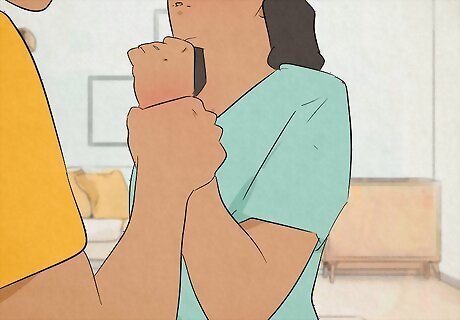
Ending a toxic or abusive relationship can lead to violence. The abuser may make threats to harm their partner, take or harm their children, or even harm or kill pets, neighbors, friends, or other family members. Sadly, these threats are sometimes carried out. That's why it's important for someone who's being abused to make an exit plan to leave safely. Studies show that an abused person is most likely to experience violence in their relationship when they're leaving or shortly after ending the relationship. Taking the steps to make these plans can feel scary and overwhelming, which can make a person stay longer than they normally would. However, by creating a safe exit plan, they'll have a better chance of successfully getting out and ending the abuse.
Their relationship isn't always bad.

In the cycle of abuse, there's a honeymoon period. After the toxic partner lies, cheats, or abuses their partner, they'll work hard to win the other person back. They may apologize and make promises that they'll change, and they might even actually change—for a while. Eventually, though, the cycle typically repeats itself, and the toxic behaviors happen again. When things are good, it can be really hard for the abused partner to leave. They may hope that things are better for good, and they don't have as much motivation to uproot their life and risk upsetting their partner.
Low self-esteem can make them feel like they deserve it.

Toxic relationships can destroy a person's self-worth. The victim of a toxic relationship will often hear how worthless they are on a daily basis. That can really wear a person down over time. They might believe that they deserve to be abused, or that no one else will want to be with them. They may not even believe they have the strength to leave and start over. Often, the relationships will start with the narcissistic or abusive partner showing a lot of affection to the other person. Once there's a strong bond there, the abuser will gradually start to criticize and belittle their victim, eroding their self-esteem over time. Low self-esteem can also be a defensive behavior—if they submit to their abuser, it can help minimize the severity of the abuse. These self-esteem issues can persist long after the relationship is over, making it hard to trust others in the future. That fear of trusting others can also make it difficult to reach out for help.
They may have limited access to finances.
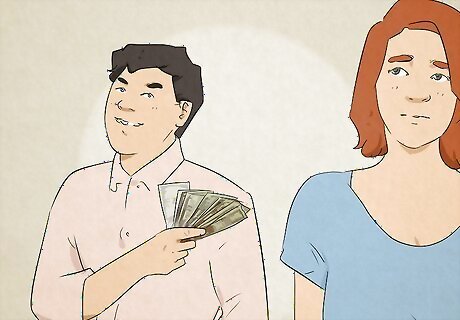
Abusers often control all of the money in the household. It can feel impossible to leave a relationship if there are financial barriers at every step. How do you leave if you don't have your own vehicle, or even bus fare? Where do you stay if you can't afford a hotel room, much less rent? How will you care for and feed your children? These questions can feel overwhelming to someone stuck in a toxic relationship. It can be really helpful to find a support system that can help the abused person get on their feet once they leave. If friends and family aren't available to help, consider reaching out to local domestic abuse shelters or support hotlines.
They may stay due to trauma bonding.
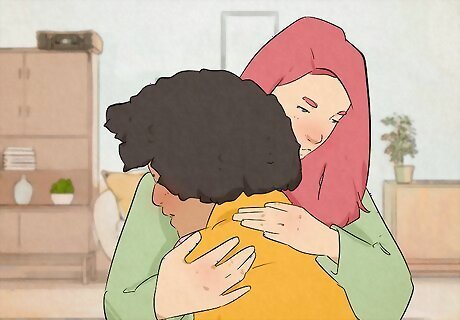
This is an attachment that forms between an abuser and a victim. If someone is cold or angry towards you for long periods, but they occasionally give you a little affection, it can actually reprogram your brain. When you get that warmth, your brain is flooded with dopamine, which makes you feel closer to that person. This is called trauma bonding, but to the person experiencing it, it usually feels more like love, attachment, and loyalty. Trauma bonding can look like a person making excuses for their partner, like, "She had a really rough childhood, and sometimes she acts out the abuse she suffered," or, "He loves me even though his addiction makes him lie and steal from me." Someone who has this type of affection might understand that their relationship is unhealthy, but they may feel like they have to stay because they're the only person who can help their partner. They may also feel that leaving would be disloyal. They may also be very defensive of their relationship if others criticize it. In some part, they may be hoping that by protecting their partner, their partner will protect them in return.
They might think things will get better.
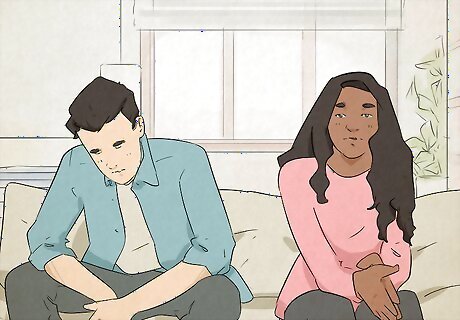
Some people will stay as long as they have hope. They might believe their partner's promises that they'll change, or they might focus on their partner's potential instead of how they actually are behaving. Unfortunately, you can't love someone into changing, but it's common for victims of domestic abuse to believe in a hopeful future anyway. Many abusers will love-bomb their victims, meaning they shower their partner with gifts, affection, and over-the-top declarations of love to win them back after an incident of abuse. This can trick the victim into thinking the abuse won't happen again.
Society can sometimes pressure them into staying.
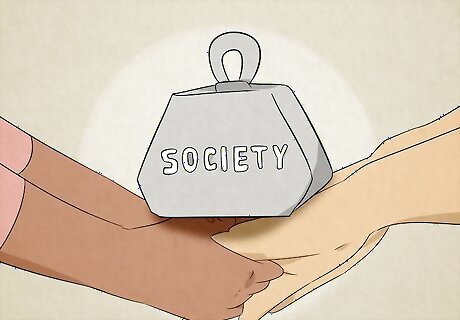
The person might feel like they're failing if they leave. They might have gotten messages from their family and friends that marriage is forever, or that ending a relationship or a long-term marriage is giving up. They may also have religious or cultural beliefs that impact their decision to stay. The person might feel embarrassed to admit that their relationship was toxic, especially if it looked perfect from the outside. Abusers are often charming and manipulative, so this happens more than you might think. They might also feel like they don't have anyone who can help them, especially if their early attempts to disclose their abuse were brushed off.
It can be hard to separate if children are involved.
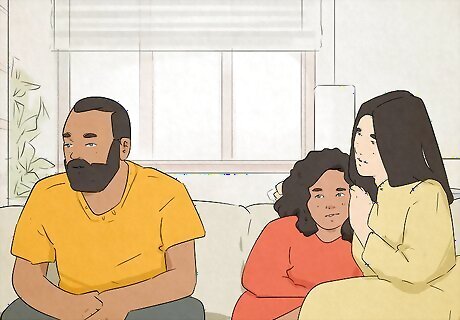
The parent might feel it's easier to protect their children by staying. If they leave without their children, the abused person might worry that the children will then be in danger. On the other hand, if they take the kids with them when they leave, they might be concerned about the quality of life they can provide for them, especially if financial abuse is also a factor. In some cases, the parent might feel it's in the children's best interest to have both of their parents present.
They might not have anyone to turn to.

Abusers often separate their victims from others. They typically do this over a period of time, cutting off the person from friends, family, coworkers, and other sources of support. The victim then becomes totally dependent on their partner. If they do think about leaving, they might worry that others won't believe them or be willing to help. They might also stay because they're afraid that they won't be able to find another relationship in the future. They could also feel like they can't trust their family, friends, or even the police to help them. If the person is undocumented, they may worry that seeking help will expose their immigration status.
They might be afraid of being outed as LGBTQIA+.
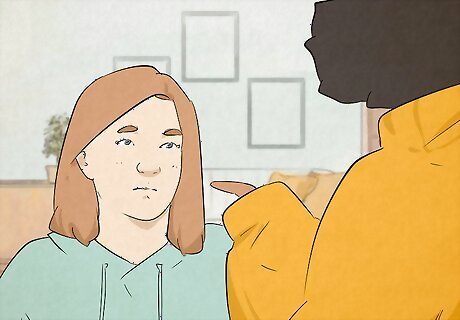
This can happen if the person is in a same-sex relationship but they're not out. If someone is in a toxic same-sex relationship, they may be concerned that their partner will tell others about their relationship if it ends. Their partner may even threaten to out them to family, friends, or coworkers. This manipulation can cause a person to stay, even if they're unhappy in their relationship. This is especially common in younger people who may just be starting to learn about their own sexuality.













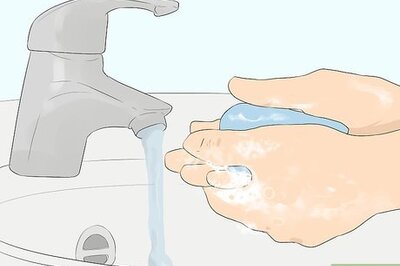

Comments
0 comment